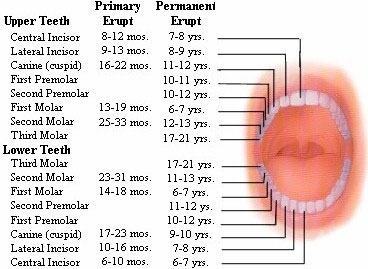
Good oral health practices should begin in infancy and continue throughout adult life. In your child’s early years, you must provide this care. Later you will need to instruct, monitor and motivate your child to help maintain good oral health habits. Attitudes and habits established at an early age are critical in maintaining good oral health throughout life.
“First visit by first birthday” sums it up. Your child should visit a pediatric dentist when the first tooth comes in, usually between six and twelve months of age. Early examination and preventive care will protect your child’s smile now and in the future.
The most important reason is a practical prevention program. Dental problems can begin early. A big concern is nursing or baby bottle tooth decay. Your baby risks severe decay when he or she nurses continuously from the breast or from a bottle of milk, formula or juice during naps or at night. Another concern is gum disease.
Recent studies show nearly half of all children aged two and three have at least mild inflammation of gums tissues.
From six months to age three, your child may have sore gums when teeth erupt. many babies like a clean teething ring, cool spoon or cold wet wash cloth. Some parents swear by a chilled teething ring; others simply rub the baby’s gums with a clean finger.
Don’t nurse your child to sleep or put your baby to bed with a bottle of milk, formula, juice, or sweetened liquid. Use only water in the bottle or sippy cup. Check with your pediatric dentist to make sure your child is getting enough fluoride for decay protection. Lastly, learn how to brush and floss your child’s teeth.
Thumb sucking is perfectly normal for infants, most stop by age two. If your child doesn’t, discourage it after age three. Prolonged thumb sucking can create crowded teeth, crooked teeth, and bite problems.We will be glad to suggest helpful ways to address a prolonged thumb-sucking habit.
Try having your child lie down. Put your child on your lap or on the floor, keeping his/her head steady with your legs. If your child is standing, have his/her back to you with their head tilted slightly and resting against your body. Have your child hold a mirror while you brush and floss their teeth so your child can see what is being done.
Yes. If you have to miss a brushing, the bedtime one is probably the worst one to miss. If you don't get rid of the bacteria and sugar that cause cavities, they have all night to do harm. While you are awake, saliva helps keep the mouth clean. When you are asleep, there is less saliva produced to clean the mouth. For this reason it is important to brush before bedtime.

Please remember, the earlier the dental visit, the better the chance of preventing dental problems. Children with healthy teeth chew food easily, learn to speak clearly andsmile with confidence. Start your child now on a lifetime of good dental habits Common Pediatric Dentistry Procedures Include